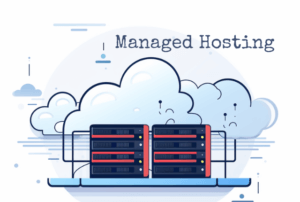Maximizing Your Site’s Performance
Hey there, fellow web enthusiasts! Right now the internet is more crowded than a New York subway at rush hour, so ensuring your website stands out is not just important; it’s essential. But fear not, because the latest advancements in web hosting technology are like your very own digital superhero, ready to lift your site’s potential to new heights. Let’s dive into some of these exciting developments.
The Future is Cloudy (In a Good Way)
Cloud hosting offers a robust, scalable, and cost-effective solution for websites of all sizes. Its ability to ensure high availability coupled with the capacity to handle traffic surges without breaking a sweat, makes it an excellent choice for businesses looking to maximize their online potential.
High Availability and Redundancy
One of the core benefits of cloud hosting is its high availability and redundancy. By distributing data across multiple servers, the risk of downtime is significantly reduced. If one server encounters an issue, another can seamlessly take over, ensuring your website remains online without interruption. This is crucial for sites where downtime equates to lost revenue and damaged reputation.
Scalability – Beyond Limits
Unlike traditional hosting, where scaling up often involves physical hardware upgrades or migration to a more powerful server, cloud hosting allows for on-the-fly resource allocation. This means you can increase or decrease your computing resources (CPU, RAM, bandwidth) based on real-time demand without downtime.
For example, an e-commerce website during a major sale event, like Black Friday or Cyber Monday, can experience unpredictable spikes in traffic. Cloud hosting enables such websites to scale resources instantly, maintaining performance without pre-purchasing additional capacity that would remain unused during off-peak times.
Performance and Speed
Cloud hosting also improves website performance and loading times. With data distributed across multiple servers, a website can be served from the server closest to the visitor, reducing latency. Advanced caching techniques and content delivery networks (CDNs) are often integrated into cloud hosting solutions, further enhancing speed and user experience.
Cost Efficiency
From a cost perspective, cloud hosting introduces a pay-as-you-go model, where you only pay for the resources you actually use. This can lead to significant savings, especially for sites with fluctuating traffic, as it eliminates the need to maintain expensive infrastructure to handle peak loads.

Security Considerations
Security in a cloud hosting environment is multi-faceted. Providers typically offer built-in security measures, including data encryption, firewalls, intrusion detection, and regular security audits. However, the shared nature of the cloud means that vigilance is necessary, and the responsibility for securing a site often falls on both the provider and the user.
Real-World Application
Looking at any global news website that needs to serve millions of readers around the world with breaking news updates. Cloud hosting allows such a site to distribute its content across a global network of servers, ensuring fast loading times regardless of where the reader is located, and dynamically adjusting resources to handle sudden spikes in readership.

VPS Advancements
To truly appreciate the advancements in VPS hosting, it’s important to understand where it started. Traditionally, VPS was a step up from shared hosting, offering a slice of a server’s resources dedicated solely to your website or application. This was a significant improvement over shared hosting, where resources are, well, shared among numerous users, often leading to performance issues if one website on the server experienced a spike in traffic or a security breach.
Customization & Scalability
Today’s VPS hosting solutions are crafted to fit your website’s specific needs. This level of customization goes beyond mere resource allocation (CPU, RAM, storage, etc.). It now includes advanced features like auto-scaling, where your hosting plan dynamically adjusts resources to meet demand in real time. This is particularly crucial for businesses that experience fluctuating traffic levels. Rather than paying for peak-level resources all the time, you pay for what you use, when you use it. This is great for ecomm stores that run sales at various times.

Intuitive Management Interfaces
One of the most significant advancements in VPS hosting has been in the management interface. Providers have developed control panels that are not just powerful, but also user-friendly, catering to both beginners and seasoned tech professionals. These interfaces offer a simple representation of your server’s performance metrics, with easy access to tools for software installation, and security management. With these advancements, you no longer have to be a Tech Genius to drive it.
Automation and AI Integration
The integration of automation and AI technologies into VPS management has been a game-changer. Automated backups, security scans, and updates are now standard features, ensuring that your site’s infrastructure is always up to date and protected against the latest threats without manual intervention. And as a website builder who occasionally forgets about updates this has saved me on more than one occasion.
AI can also play a role in optimizing server performance, analyzing patterns to predict traffic surges and automatically adjusting resources to maintain optimal operation.
Security Improvements
Security in VPS hosting has also seen significant improvements. With virtual technology, each VPS is isolated from others on the same physical server, which means if one VPS is compromised, the others remain unaffected. Advanced security features like firewalls, intrusion detection systems (similar to a virtual ring camera on your server), and malware scanning are now more accessible, providing peace of mind for website owners and developers.

The Future of VPS Hosting
The evolution of VPS hosting has been remarkable, transforming it from a niche solution for tech enthusiasts to a mainstream hosting option that balances performance, control, and cost. VPS hosting is set to become even more intuitive, secure, and scalable, ensuring that it remains a compelling choice for businesses and individuals looking to maximize their online presence.
As we move forward, the line between high-end hosting solutions and accessible, user-friendly services will continue to blur, making advanced web hosting capabilities available to a broader audience. The future of VPS hosting is not just about providing space on a server; it’s about offering a comprehensive, customizable, and secure online infrastructure that meets the evolving needs of the digital world.
AI Integration
AI-Driven Security Enhancements
AI-driven security systems are becoming increasingly sophisticated, capable of analyzing patterns and behaviors to identify potential threats. This preemptive approach means that AI can often detect and neutralize malicious activities, such as DDoS attacks or attempts at data breaches, before they cause any harm. By continuously learning from new data, these AI systems evolve over time, staying ahead of the latest cybersecurity threats.
Automating Site Management
AI technology is also making site management more efficient. By automating routine tasks, such as data backups and software updates, AI frees up website owners and administrators to focus on the actual running of their businesses. This automation ensures that backups are performed regularly and updates are applied promptly, reducing the risk of data loss and vulnerabilities.

Real-Time Performance Optimization
Perhaps one of the most impactful uses of AI in web hosting is in real-time performance optimization. AI algorithms can monitor website performance around the clock, analyzing traffic patterns and resource usage to predict and react to potential slowdowns before they affect user experience. This can include dynamically allocating resources during traffic surges or optimizing content delivery based on the geographic location of visitors.
Predictive Resource Allocation
AI takes scalability to a new level with predictive resource allocation. By analyzing trends and predicting future needs, AI can automatically adjust hosting resources to meet demand. This not only ensures optimal performance but also helps in managing hosting costs more effectively, as resources are scaled up or down based on actual needs.
Enhanced User Experience
AI contributes to an enhanced user experience (UX) by ensuring websites are fast, secure, and always available. This not only improves satisfaction for visitors but can also contribute to higher search engine rankings, as speed and security are important factors in SEO (Search Engine Optimization).
Real-World Examples – Seeing Is Believing
Let’s take Shopify, a giant in the e-commerce space. It leverages cloud hosting to offer its users fast, reliable online stores that can handle any traffic spike thrown their way. Or take WordPress.com’s VIP hosting solution, which combines cloud and VPS technologies to power some of the biggest sites on the internet, offering scalability, security, and speed that’s hard to beat.
The Future Is Now
The world of web hosting is evolving at breakneck speed, and these advancements are just the tip of the iceberg. By leveraging cloud hosting, VPS advancements, and AI integration, you’re not just keeping up with the times; you’re setting yourself up as a frontrunner in the online community.
Remember, the goal is not just to have a website but to have a website that thrives, engages, and converts. With these technologies at your disposal, you’re well on your way to maximizing your site’s potential in 2024 and beyond.






